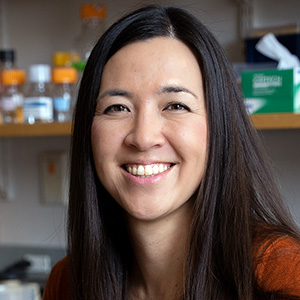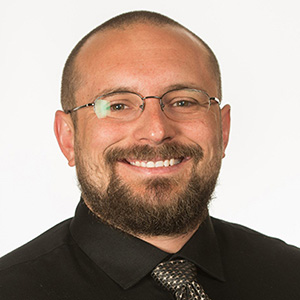Simcox and Gisriel receive mentoring award
Judith Simcox and Christopher Gisriel received the Distinguished Faculty and Staff Postdoc Mentoring Award from the University of Wisconsin–Madison Postdoctoral Association. Given annually, the award recognizes faculty and staff who contribute their time, knowledge, energy and enthusiasm to mentoring postdocs in their labs. The awardees were honored at the association’s Celebration of Postdoc Excellence in May.

Simcox is an associate professor of biochemistry at UW–Madison. The Simcox lab studies plasma lipids, which largely serve as signaling molecules to regulate cardiovascular disease and Type 2 diabetes. She and her team are striving to identify novel lipids and determine how their production is regulated and how they function in metabolic disease. Simcox was named an Emerging Investigator by the University of Illinois Chicago in 2020 and a member of the Howard Hughes Medical Institute's inaugural class of Freeman Hrabowski Scholars in 2023. She won the American Society for Biochemistry and Molecular Biology 2024 Walter A. Shaw Young Investigator Award in Lipid Research.
“The impact of postdocs on this campus through the classes they teach and the projects they lead makes me realize the true power of mentorship,” Simcox said. “Each person you mentor has the ability to transform the world through their discoveries, good work and teaching. … Since the nomination for this award came from postdocs in my lab, it’s a reminder that all the early mornings and long days to support my trainees are recognized and valued.”

Gisriel is an assistant professor of biochemistry at UW–Madison. Gisriel’s lab studies the conversion of light energy into chemical energy in photosynthesis and the role of macromolecules called photosystems. Using structural biology techniques, the team is investigating the molecular mechanisms, diversity and evolution of the photosystems involved in oxygenic photosynthesis. Gisriel received a National Institutes of Health Pathway to Independence Award and a Wisconsin Space Grant Consortium's Early-Stage Investigator Award.
“What an honor it is to receive recognition for mentorship from postdocs,” Gisriel said. “I was a postdoc myself not long ago, so I know all too well that it is a pivotal time in the life of a scientist, both professionally and personally. As a new laboratory, we rely heavily on the work of our postdocs, so, really, this award should go to them.”
Enjoy reading ASBMB Today?
Become a member to receive the print edition four times a year and the digital edition monthly.
Learn moreGet the latest from ASBMB Today
Enter your email address, and we’ll send you a weekly email with recent articles, interviews and more.
Latest in People
People highlights or most popular articles

Simcox wins SACNAS mentorship award
She was recognized for her sustained excellence in mentorship and was honored at SACNAS’ 2025 National Conference.

From humble beginnings to unlocking lysosomal secrets
Monther Abu–Remaileh will receive the ASBMB’s 2026 Walter A. Shaw Young Investigator Award in Lipid Research at the ASBMB Annual Meeting, March 7-10 in Washington, D.C.

Chemistry meets biology to thwart parasites
Margaret Phillips will receive the Alice and C. C. Wang Award in Molecular Parasitology at the ASBMB Annual Meeting, March 7-10 in Washington, D.C.

ASBMB announces 2026 JBC/Tabor awardees
The seven awardees are first authors of outstanding papers published in 2025 in the Journal of Biological Chemistry.

Decoding how bacteria flip host’s molecular switches
Kim Orth will receive the Earl and Thressa Stadtman Distinguished Scientists Award at the ASBMB Annual Meeting, March 7–10, just outside of Washington, D.C.

Thiam elected to EMBO
He was recognized during the EMBO Members’ Meeting in Heidelberg, Germany, in October.

